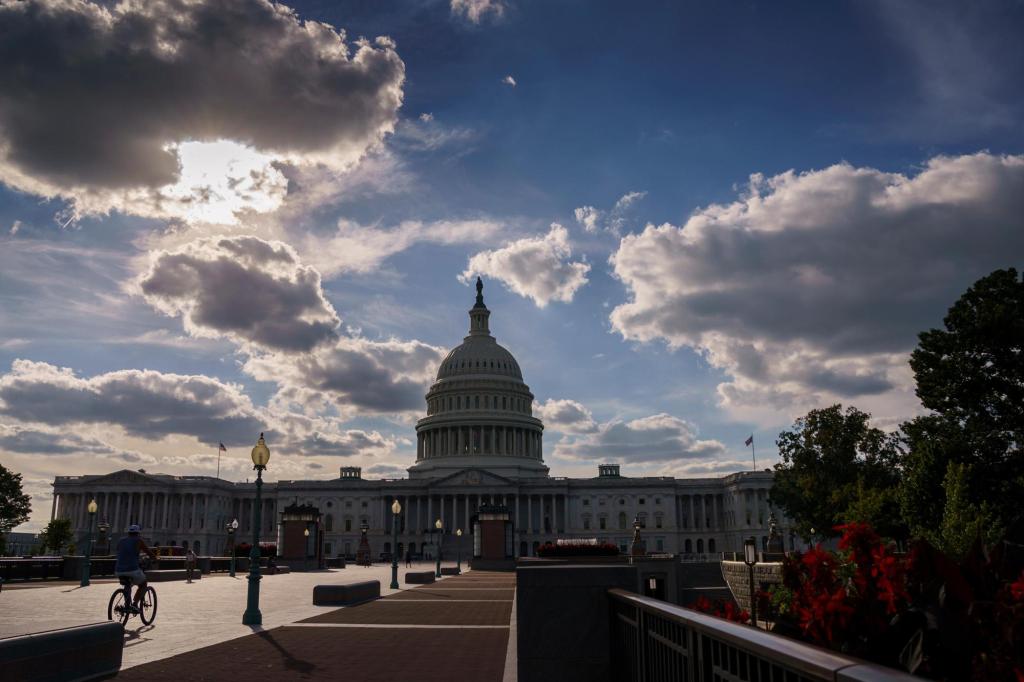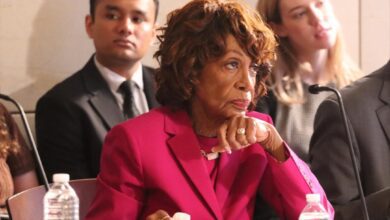What does it mean — including in Southern California? – Daily News

The U.S. government appears on its way toward a shutdown this weekend, a potentially dire consequence of a political stalemate over congressional spending — which would would disrupt many services, financially squeeze federal workers and shake confidence in the national economy.
And California, with its large number of federal employees, could feel the brunt of shutdown’s impact, though how much pain the Southland in particular, or the state and nation at large, will depend on how long the stalement lasts.
But at minimum, nonessential federal services could stop or be delayed. Federal contractors and public universities could see their funding dry up. Essential workers will keep doing their jobs, but without paychecks — including members of the U.S. Armed Forces. And if they don’t get paid, those workers won’t be able to spend as much, which could hurt the overall economy.
“Essentially, every day will get worse and there will be less and less services,” Rep. Robert Garcia, D-Long Beach, said in a Thursday afternoon, Sept. 28, interview. “You may not see all the services impacted on the first day — but by the second, third or fourth week, it’s going to be really, really hard.”
How we got here
The potential shutdown stems from Congress’ inability, to this point, to agree on federal spending.
Congress is required to pass 12 different spending bills to fund agencies across the government ahead of the start of the new federal fiscal year, which begins on Oct. 1.
Unless Congress, which is severely divided along party lines, manages to come to a last minute consensus and pass bills ahead of that deadline, the government will effectively shutdown on Sunday just after midnight.
The Democratically controlled Senate has been working to win approval for a bipartisan stopgap measure — otherwise known as a continuing resolution — which would temporarily avert a shutdown.
It would maintain funding at current levels, with a $6 billion boost for Ukraine and $6 billion for U.S. disaster relief, among other provisions, and fund the government through Nov. 17 while allowing Congress additional time to hammer out the details of a long-term spending plan.
But some Republicans in the House, where that party has the majority, have taken issue with the additional funding for Ukraine. They’ve also argued that Congress needs to include harsher border security measures in its spending packages for the upcoming fiscal year, and want to slash government spending for many federal agencies.
“(President Joe Biden) threatened to veto the defense spending bill because of my 30% pay raise for our troops,” Rep. Mike Garica, R-Santa Clarita, who did not return request for comment, said in a Thursday afternoon tweet. “Now he wants to pay Ukrainian soldiers during a potential shutdown when our own soldiers would go unpaid. I cosponsored the Pay Our Troops Act to right this wrong and make sure our men and women in uniform don’t miss a paycheck.”
House Speaker Kevin McCarthy, who represents California’s 20th Congressional District, has outright rejected the bipartisan Senate plan. Instead, he’s trying to persuade the far-right members of his House caucus to approve the Republican Party’s own temporary stopgap measure, which would cut federal spending by 8% from many agencies and toughen border security.
But some far-right Republicans have rejected their own measure — as they seek even steeper cuts. That makes resolution getting the OK ahead of the shutdown deadline unlikely.
That schism, which has frequently tested McCarthy’s control of his caucus, has proved a significant hurdle.
On Thursday, 27 members of the House Freedom Caucus signed a letter that asked McCarthy to detail his plan to address various concerns, including possible funding for Ukraine and implement further spending reductions.
“No member of Congress can or should be expected to consider supporting a stop-gap funding measure without answers to those reasonable questions,” the letter said. “We remain ready to work in good-faith with out colleagues across the Republican Conference to advance appropriations.”
Rep. Robert Garcia, though, decried Republican’s lack of support for a temporary funding measure.
“Republicans, at a minimum, (could) continue to fund the government temporarily while we worked out some of the differences, but instead, they want to actually hurt people and it’s really a shame,” Garcia said. “We’re trying to stop it. Whether or not we’re able to, they’re in the majority. It’s up to them.”
Potential consequences
It’s unclear how long a government shutdown could last, though many are bracing for a stoppage that could last weeks. That would have detrimental impacts on hundreds of thousands of federal employees — and those who rely on government services.
The longest government shutdown happened in 2018-19, when then-President Donald Trump and congressional Democrats entered a standoff over his demand to fund a border wall.
The disruption lasted 35 days, through the holiday season, but was also only a partial government shutdown because Congress had passed some appropriations bills to fund parts of the government.
California, meanwhile, would likely be hit hardest during this potential shutdown, especially since the state is home to the largest population of federal employees in the country — Washington D.C. notwithstanding — with more than 362,000 workers at myriad government agencies, according to the U.S. Office of Personnel Management.
All of those employees will go without paychecks for the duration of the shutdown — and Californians won’t be able to access crucial services provided by the federal government.
“Everyday support that people rely on — they’re traveling, they need information about their small business, they need help with Social Security or Medicare,” Garcia said. “Those agencies will either be shut down or services will be slowed, so people are going to feel the impact not just federal workers, but also people that are looking for federal services.”
People applying for government services like clinical trials, housing and food assistance, passports and more, for example, could see delays.
Some federal offices, including those for local congressional representatives such as Garcia, will also have to close or face shortened hours during a shutdown.
The Southland’s sizable military and veteran population could be particularly squeezed by the shutdown.
While active-duty members of the military would be forced to work without pay, civilian workers on Southern California bases would be furloughed. (Once the shutdown ends, they would receive backpay.)
Access to services on bases could become limited, including to health care – with elective surgeries and dental visits likely being postponed.
Veterans who rely on health and commissary services on bases would also be impacted. About 80,000 veterans live within 50 miles of Camp Pendleton and many use the base for medical and grocery needs.
At bases in California, including Camp Pendleton, Naval Weapons Station Seal Beach, Joint Training Base Los Alamitos, March Air Force Base and Marine Air Ground Combat Center Twentynine Palms, thousands of civilians help run the facilities by working in maintenance, clerical and environmental jobs.
At the Seal Beach station, work supporting “mission-critical” fleet activities would continue, said spokesperson Gregg Smith. That means things such as munitions transfers, storage and maintenance, safety, and security.
“Military training, especially related to safety and security, will continue,” Smith said, adding that work on the new ammunition pier would not be impacted because the project is already paid for.
Should the situation become dire, though, it will be up to the community to help.
Evan Gost, a member of Team Darkhorse — the Laguna Hills committee that adopted the 3rd Battalion/5th Marines at Camp Pendleton in 2010 — said that will happen. That committee raises money and plans activities to support the Marines and their families.
Should “families in our battalion need help,” Gost said, “we will step up.”
Joe Cartwright, who heads up Newport Beach’s 1/1 Foundation, which supports Camp Pendleton’s 1st Battalion, 1st Marine Regiment, said his group will also wait and see what happens and “take direction in the event the unit has any needs.”
Economy could take a hit
The shutdown, though, could have even more dire consequences — to the national economy.
Lawmakers have warned that a shutdown could rattle financial markets. and Goldman Sachs has estimated that a shutdown would reduce economic growth by 0.2% every week it lasted, though the financial giant also said growth would then bounce back after the government reopens.
Two main drivers of Southern California’s local economy — the ports of Long Beach and Los Angeles — said Thursday they aren’t anticipating any serious impacts from a short-lived shutdown.
Customs and Borders operations will be deemed essential, said Port of Los Angeles spokesperson Phillip Sanfield, and “trade at the ports is expected to continue normally.”
U.S. Coast Guard Chief Petty Officer Levi Read, meanwhile, said all essential operations will continue, including search and rescue, oil spill responses and keeping ports open.
“In the event of a short-lived federal shutdown,” said Port of Long Beach spokesperson Lee Peterson, “we do not expect to see any direct impacts to port operations.”
But it’s unclear how that might change in the event of a drawn out shutdown. Cargo numbers, after all, are tied to the strength of the economy.
And the local economy could take a hit in other aspects, depending on the length of the looming shutdown.
Because more than 362,000 federal employees living in California won’t be paid during the shutdown, a Friday, Sept. 22, Congressional Research Service report said, they may opt to decrease their spending — a major driver of the economy.
“Indirect effects are more difficult to accurately measure and, therefore, are often not included in estimates of economic effects of shutdowns,” the report said, “However, some research suggests that these effects can be significant.”
The shutdown could also impact Southern California’s higher education institutions, many of which rely on federal funding to carry out their operations.
University of California President Michael Drake, for example, said in a Sept. 20 letter to the California Congressional Delegation that federal funding is critical to the UC’s education, research, health care and public service mission.
“The University is concerned that a government shutdown, particularly one that lasts for an extended period of time,” he wrote, “could have adverse effects on our research and education activities, as well as our health care enterprise.”
Other businesses closely connected to the federal government, such as federal contractors or tourist services around national parks, could see disruptions and downturns as well.
There was no word Thursday on whether the Angeles National Forest and the Joshua Tree National Park will remain open to visitors during the shutdown. Representatives from the Department of Interior haven’t commented on how the potential of a shutdown would affect the National Park Service.
But each agency within the department, including the NPS, is required to maintain a contingency plan for service in the event of a government shutdown.
The NPS, however, hasn’t updated its plan since 2019.
During the 2018-19 shutdown, NPS kept parks open to the public — albeit with no visitor services — as long as conditions remained safe, per its shutdown contingency plan.
But that policy turned out badly for Joshua Tree in particular — where a small number of the park’s Joshua Trees were destroyed, alongside several other instances of vandalism and other damage to the area’s sensitive ecosystem.
The National Parks Conservation Association, a nonprofit organization, estimates that NPS would turn away about 1 million daily visitors during this year’s shutdown, resulting in a $70 million daily revenue loss for communities surrounding the parks.
“It’s unfathomable that our country is on the brink of another government shutdown,” NPCA President Theresa Pierno said Thursday. “But if Congress is unable to do its job and fund our government, the National Park Service must do what’s necessary to protect our most treasured places and close their gates.”
Government officials, meanwhile, have said it’s impossible to predict whether Congress will reach a resolution before Sunday. Garcia, for his part, called on his fellow Californian, McCarthy, to push his colleagues to support the bipartisan deal.
“Our state is going to be more impacted than any other state,” Garcia said. “And so he needs to push against (the) extremists and do what his Republican colleagues in the Senate overwhelmingly are doing — which is trying to avert a shutdown and supporting this bipartisan plan.”
Staff writers Donna Littlejohn, John Orona and Erika Ritchie contributed to this report. Associated Press writers Lolita Baldor, Mark Sherman, Fatima Hussein, Lindsay Whitehurst, Josh Boak, Kevin Freking and Lisa Mascaro also contributed to this report.










